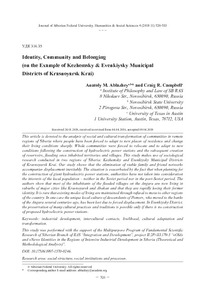Identity, Community and Belonging (on the Example of Kezhemsky & Evenkiysky Municipal Districts of Krasnoyarsk Krai)
Скачать файл:
URI (для ссылок/цитирований):
https://elib.sfu-kras.ru/handle/2311/71071Автор:
Ablazhey, Anatoly M.
Campbell, Craig R.
Аблажей, А.М.
Кэмпбелл, К.
Дата:
2018-04Журнал:
Журнал Сибирского федерального университета. Гуманитарные науки. Journal of Siberian Federal University. Humanities & Social Sciences;2018 11 (4)Аннотация:
This article is devoted to the analysis of social and cultural transformation of communities in remote regions of Siberia where people have been forced to adapt to new places of residence and change their living conditions sharply. Whole communities were forced to relocate and to adapt to new conditions following the construction of hydroelectric power stations and the subsequent creation of reservoirs, flooding once inhabited territories and villages. This study makes use of sociological research conducted in two regions of Siberia: Kezhemsky and Evenkiysky Municipal Districts of Krasnoyarsk Krai. Our study shows that the elimination of stable family and friend networks accompanies displacement inevitably. The situation is exacerbated by the fact that when planning for the construction of giant hydroelectric power stations, authorities have not taken into consideration the interests of the local population – neither in the Soviet period nor in the post-Soviet period. The authors show that most of the inhabitants of the flooded villages on the Angara are now living in suburbs of major cities like Krasnoyarsk and Abakan and that they are rapidly losing their former identity. It is rare that existing modes of living are maintained through refusal to move to other regions of the country. In one case the unique local culture of descendants of Pomors, who moved to the banks of the Angara several centuries ago, has been lost due to forced displacement. In Evenkiysky District, the preservation of many cultural practices and traditions is possible only if there is no construction of proposed hydroelectric power stations Статья посвящена анализу трансформации локальной идентичности населения удаленных регионов Сибири в ходе адаптации к новым местам проживания и резко изменившимся условиям
жизнедеятельности. Необходимость подобной адаптации обусловлена строительством ГЭС
и затоплением территории традиционного проживания. В качестве эмпирической базы использованы материалы социологических исследований, проведенных в двух регионах Сибири: Эвенкии и Кежемском районе Красноярского края. Показано, что вынужденный переезд на
новое место неизбежно сопровождается размыванием сложившихся семейных, дружеских, соседских связей. Ситуацию усугубляет то обстоятельство, что при обсуждении проектов строительства гигантских ГЭС всерьез никто не учитывал интересы местного населения – ни в советский, ни в постсоветский периоды. Авторы доказывают, что жители затопленных деревень на Ангаре, теперь населяющие пригороды Красноярска и Абакана, стремительно
теряют прежнюю идентичность. Стратегия адаптации, предусматривающая максимально
полное следование сложившейся модели жизнеобеспечения и отказ от переезда в другие регионы страны, встречается редко. По сути, налицо процесс утраты уникальной локальной культуры потомков поморов, переселившихся на берега Ангары несколько столетий назад. В Эвенкии сохранение специфической модели жизнеобеспечения (традиционные отрасли хозяйства и дотационная помощь со стороны государства), а значит, и сохранение советской по своей природе локальной идентичности возможны только при отказе от строительства ГЭС

